Can Ducks Live with Chickens?
Ducks and chickens are two of the most common farm birds with similar living conditions. This makes people often wonder whether can ducks live with chickens?
Fortunately, ducks and chickens can live together without almost any problem. They don’t need widely different food and can share the space peacefully most of the time. And it’s easier to clean up the place and look after them. So, in a way, you’ll be subsiding the space and expenses too.
Even so, just like any mixed flocks, there are a few things to consider, like safety, common diseases, food and water, space, the possibility of conflicts, additional risks, etc.
Looking for more articles about ducks habitat:
Is It Safe to Keep Ducks and Chickens Together?
Safety is the first thing that matters if you want to keep ducks and chickens together. And it expands to a few specific matters.
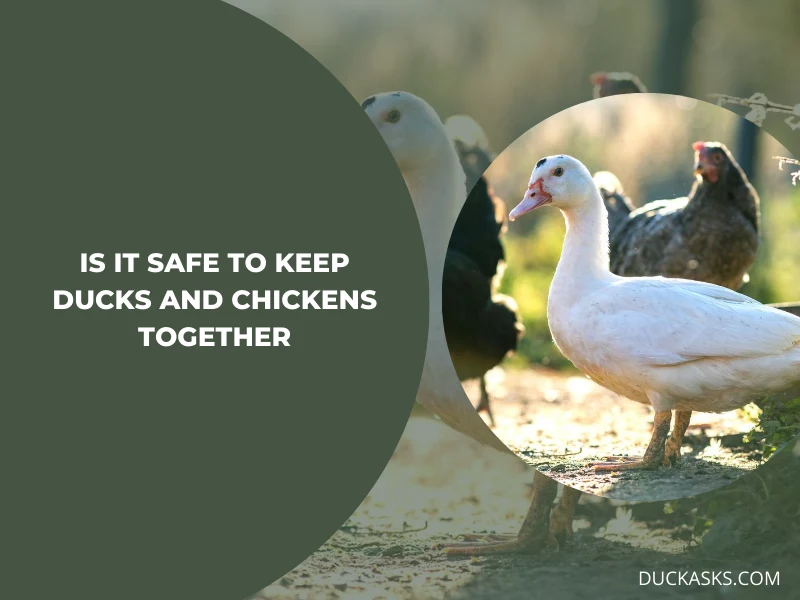
For example, if they attack each other, if there’s any risk of common diseases, etc. But mostly, it’s safe enough to keep them together.
Some of the risk factors that can arise when keeping ducks and chickens together are explained here.
Fight and Bully Among the Two Species
The dominant group or any member of the group can take to bully the other species. Such cases can lead to violent pecking and even death.
Easy Transfer of Common Bird Diseases
Both chickens and ducks can be affected by some common diseases when living in a shared space. Followings are the common diseases that can affect both chickens and ducks –
- Marek’s Disease
Even though this disease primarily affects chicken, due to a shared setup, it can also affect ducks. In rare cases, affected ducks can carry the virus and spread it to chickens.
- Infectious Bronchitis
Affect avian species spread this disease through coughing, sneezing, and nasal discharge. It results in decreased egg quality and production.
- Avian influenza (Bird Flu)
This viral disease probably has the highest mortality rates in infected birds including ducks and chicken. It affects respiratory and digestive functions and cause them to death eventually.
- Duck Plague
Among ducks, geese, and swan, Duck Plague is the most contagious viral disease. If you have a shared space for chicken and ducks, and any of the ducks have this disease, chickens will get affected as well.
Ducks are usually hardy, so they suffer less from diseases than chickens do.
Chickens on the other hand, are pretty susceptible to common illness. They easily get affected by contagious bird diseases.
So, even if the ducks don’t get sick often, they still may carry diseases and get the chickens ill. And in large groups of mixed flocks, viruses and bacteria can transfer very quickly.
Furthermore, since ducks like to play with water, they usually make a muddy mess inside the shared space.
A constantly damp environment is perfect for bacteria, viruses, and other microbial growth. As a result, the chicken may get sick.
Can Ducks Coexist Peacefully with Chickens in the Same Coop?
Ducks and chickens both have a calm demeanor and rarely engage in fights. Nevertheless, it doesn’t guarantee peace at all times.
Usually, there are pecking orders among them, where they pick a leader of the flock. Once it’s settled, both groups mostly keep away from each other, with some occasional mingling.
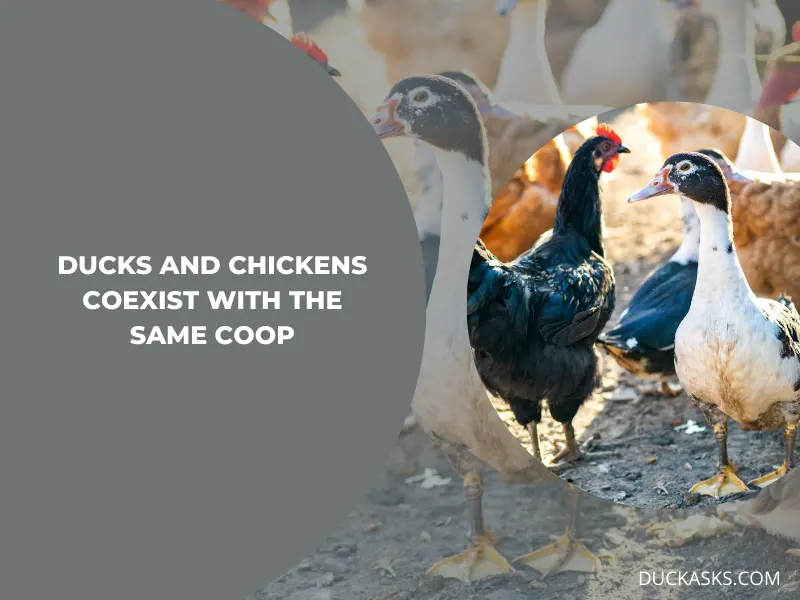
At the start, you might notice some slight aggression and bullying. But eventually, it dies down once they get used to each other.
Another reason why there might be conflicts is when there is not enough space for all the members. In fact, overcrowding and cramped coop space are one of the main reasons why mixed flocks fight among themselves.
To maintain a peaceful co-existence, keep 3-4 chicken for every one duck. So, the ducks to chickens ratio is 1:3 or 1:4.
Furthermore, sometimes the group may have an aggressive member. A single violent chicken or duck is enough to ruin the peaceful environment of the coop.
In such cases, immediately remove the aggressive duck/chicken from the group.
Apart from these scenarios, they mostly just mind their own business and sometimes even enjoy each other’s company.
Are There Any Specific Considerations When Keeping Ducks and Chickens Together?
Out of the regular considerations, you may need to keep your eyes on some specific factors as well.
Special Monitoring for Aggressive Mating Behaviors
Even though ducks and chickens have different mating behavior, often they will try to mate with members of the other species.
Especially male ducks or drakes are much more violent than roosters, and they have a high sex drive. So, if the number of female ducks is not enough, they might take an interest in the hens.
However, chickens have different anatomy than ducks. So, when a drake tries to mate with a hen, it can potentially hurt the hen.
Roosters, conversely, are calmer and don’t take much interest in mating with ducks. They also protect the hens from the drakes, so it’s a good idea to keep one rooster and drakes in the flocks.
Overall, keep an eye out for any aggressive mating behavior during the mating season.
Different Water Requirements for Swimming
Ducks need to spend quite some time in the water every day to be happy and cheerful. They swim and like to bob their heads underwater to clean out the buildup in their eyes and nostrils.
This is why you should provide a water source for them. Especially if you are raising them in a confined space and there is no natural water source for them to swim.
But make sure to build the pool a little away from the coop. Since ducks like to splash and make a mess with the water, it can dampen the area around the coop.
Chickens, however don’t like water that much and rarely go swimming.
Is It Safe for Ducks and Chickens to Share the Same Food and Water Sources?
Ducks and chickens have slightly different food and water requirements. Let’s break it down.
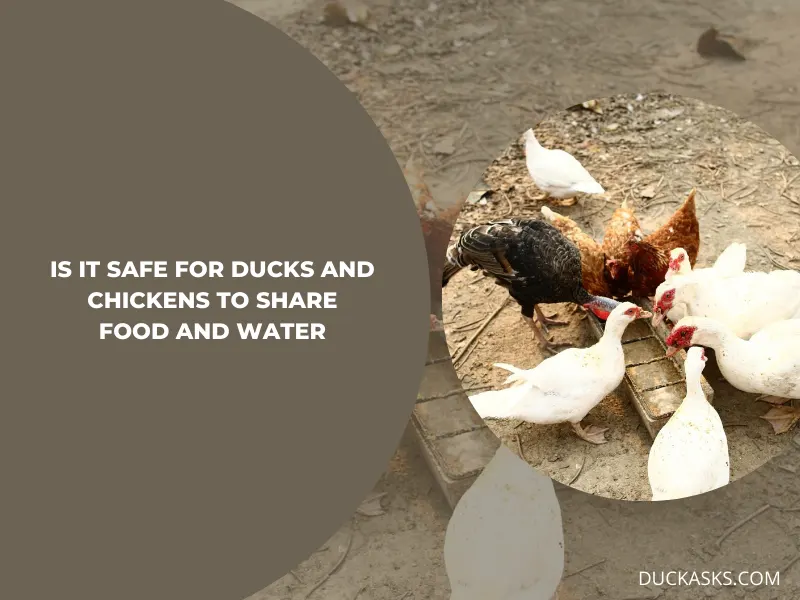
Food
When building a shared feeding arrangement for ducks and chickens, there are a few things we should pay attention to –
- Chicken Layer as Regular Feed
Most adult chickens and ducks can eat the same type of food. So, regular chicken layer feed is enough for both flocks.
They also like to free range, which is basically going around looking for snacks like worms, snails, mealworms, insects, small bugs, rodents, etc.
So, as long as they can do that, they don’t care much about the food.
- Niacin Requirements
There’s a slight difference in the nutritional requirements of the two.
For example, ducks, especially ducklings, require niacin a bit more than chickens. It’s a type of Vitamin B and a very important nutritional need to form strong bones and legs. The best way to solve this is to add some Brewer’s yeast to the feed.
Most chicken layer feed already has niacin in it. But it’s not at the optimum level for ducks. The chickens also benefit from some added niacin. For added measure, feeding the ducks some occasional niacin treats also works.
- Vegetables and Greens for Ducks and Chickens
Aside from this, ducks like to eat green peas, algae, cracked corn, pumpkin, squash, etc. Whereas chickens will eat watermelons, turnips, curds, etc.
These fresh greens are important for their healthy growth, so try to provide them as occasional snacks.
Overall, according to dietary requirements, it’s safe for ducks and chickens to share the same food, but not recommended.
- Different Eating Pace
Another thing to consider is the possibility of fights over food sharing. Since ducks eat at a faster pace than chickens, it might lead the chickens to starve. By providing enough food for all the members, you can prevent this issue.
Separating the ducklings and baby chickens from the adults during feeding time is also a good decision.
- Water
As for water, ducks and chickens have very different water requirements.
Ducks need a lot more water than chickens when they eat. They usually eat by taking a mouthful of food and swallowing it down with water.
So, there should be a water bowl next to feeding bowls at all times. Generally, deep and large bowls are ideal for them to comfortably put their head in to mix water with the food.
Chickens also need water but not as much as ducks. They don’t usually need food and water side by side either.
As a side note, ducks are messy eaters and taint the water very quickly by constantly switching between food and water bowls. Chickens on the contrary, like clean water to drink.
So, you’ll need to set up several water bowls around their feeding area for them to share comfortably.
Do Ducks and Chickens Have Different Needs for Shelter and Nesting Areas?
For housing also, ducks and chickens have different demands. So, you need to make sure the shared house fulfills both their needs.
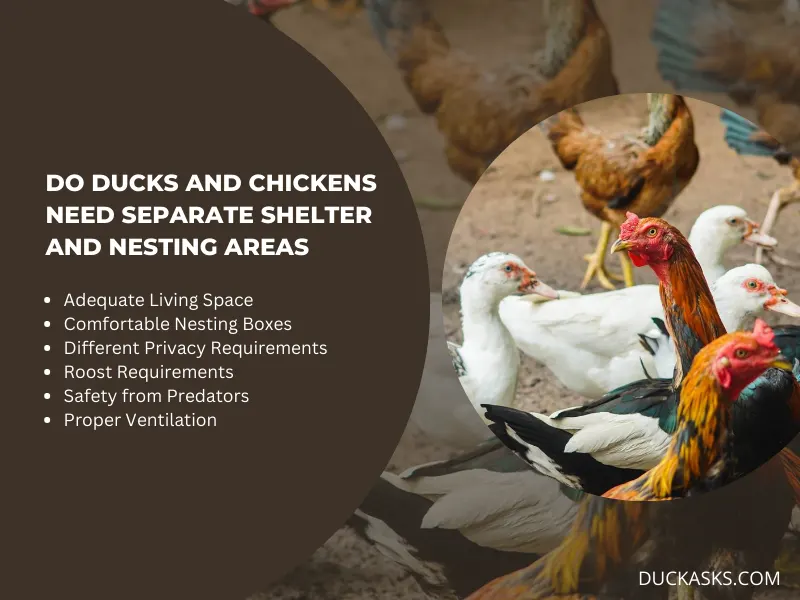
Adequate Living Space
Ducks need larger coop space because of their large wings. Usually, it’s 3 square feet of space per duck, but the larger the better. Chickens are okay with less than that. So, it’s usually 2-3 square feet per area for one chicken.
While keeping them together, it’s better to provide some extra space. That way, they can get away from each other if needed. Plus, cramped spaces can lead to fights, bullying, health issues, etc.
Comfortable Nesting Boxes
Nesting boxes for chickens and ducks are usually filled with wood shavings, bedding materials, dry straw, hay, etc. The boxes should be large enough so they can sit in them comfortably.
Usually, chickens are keener on staying in these boxes. They like higher places from the ground to rest and nest.
On the contrary, ducks prefer their nesting area on the ground due to their inability to fly. So, they are fine with some hay or straw bedding on the ground.
But if you see your ducks taking an interest in the boxes, build a few more for them as well.
Different Privacy Requirements
Chickens are more protective of their eggs and prefer quiet, enclosed spaces to lay eggs. You can use a curtain around their nesting area to provide a sense of privacy.
This encourages the chickens to lay eggs as well. On the other hand, ducks don’t care much about privacy as long as they can sit and move comfortably in their nesting area.
Roost Requirements
Platforms or bars where chickens perch and rest at night are called roosts. Ducks don’t require roosts, so they usually settle somewhere on the ground for the night.
But if you want to build them in a higher area, make sure it’s still close to the ground. Besides, the ramp for it should be wide and easy for the ducks to navigate.
Safety from Predators
The main purpose of a coop is to provide a secure place from common predators and adverse weather conditions. Both chickens and ducks are vulnerable and easy prey.
So, their housing requires strong and sturdy walls to keep foxes, raccoons, dogs, and other common predators away. Also, make sure the door is locked at night so they can’t be broken in easily.
Proper Ventilation
And last but not least, a proper ventilation system is absolutely necessary to provide a healthy environment for your mixed flocks.
Lack of ventilation can lead to various respiratory diseases. Especially with ducks, it’s hard to keep the coop area dry most of the time due to their aquatic habits.
But ventilation prevents moisture and humidity from building up inside the housing.
Do Ducks and Chickens Require Similar Care?
Caring for your ducks and chickens is not always the same. Ducks are usually sturdier than chickens, so they can tolerate cold and other environmental elements better. They also have a higher body temperature which keeps mites, ticks, lice, and other parasites away.
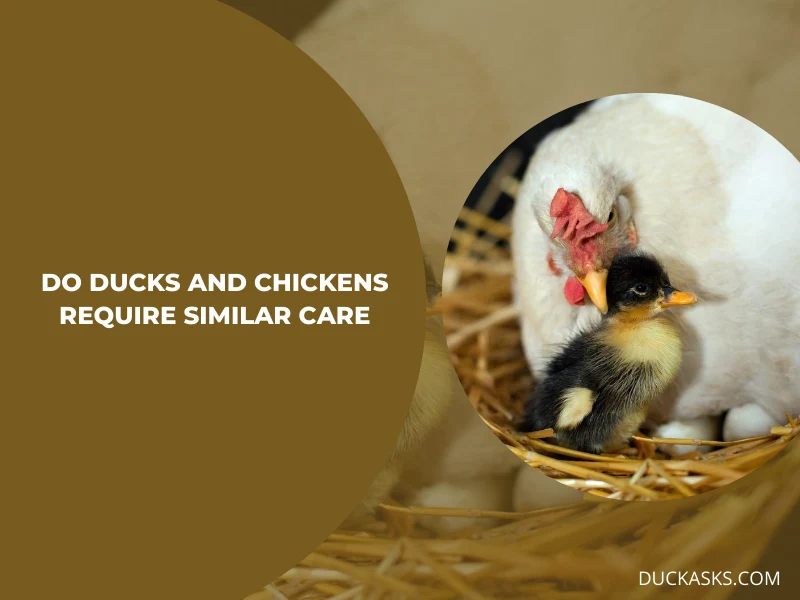
However, this is no reason for you to neglect them. On the contrary, chickens are very much susceptible to parasite infestation, bacteria, common diseases, cold weather, etc. They require clean and dry spaces for prime health conditions.
Overall, it’s going to take some extra care for the chickens to thrive but the ducks mostly can hold their own pretty well by themselves.
Tips for caring a mixed flock of ducks and chickens
- Separate any ill chicken or ducks from the group.
- Seek medical attention if any member of the flock is showing any symptoms of diseases.
- Provide your chickens and ducks shots for common bird diseases.
- Keep the coop space clean and dry.
Conclusion
Hopefully, this answers your question regarding whether can ducks live with chickens. It’s not that overwhelming, so you’ll probably figure out how to take care of them in the same space through trial and error.
The tips and suggestions we provided should be enough to give you an idea of what to expect. But there can always be unexpected issues regarding mixed flocks.
Overall, monitor them closely for any conflicts or issues and take immediate action if any. And you should be good!
Reference
- https://canalrivertrust.org.uk/enjoy-the-waterways/canal-and-river-wildlife/keeping-our-ducks-healthy/what-do-ducks-eat-6-things-you-can-feed-ducks
- https://edis.ifas.ufl.edu/publication/PS044
Image Credits:
- Shutterstock.com/photos
- Canva.com/photos






